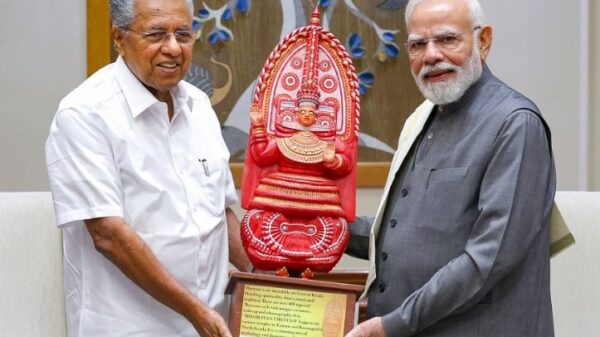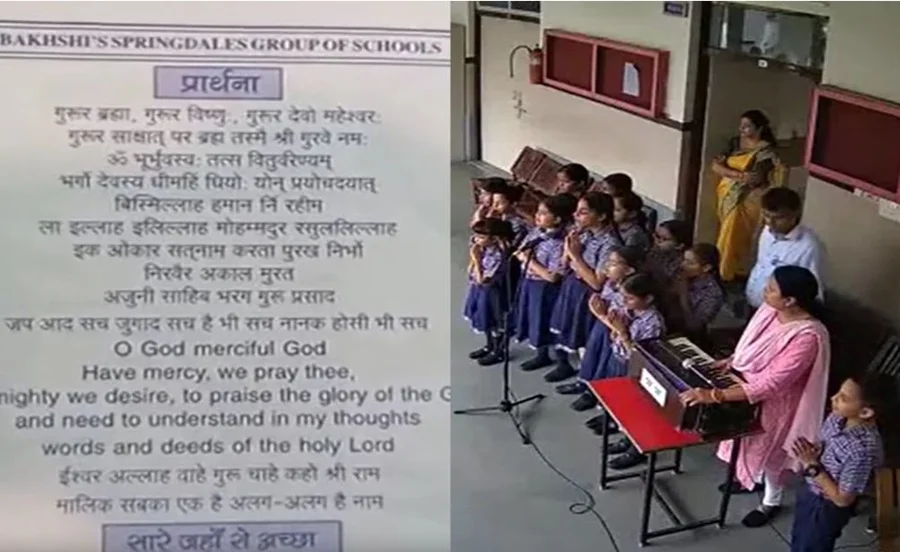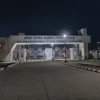A simple multi-faith prayer session at Bakshi Springdale School in Borkheda, Kota district of Rajasthan has stirred a storm of communal tension, with Hindu right-wing groups alleging that Hindu children were compelled to recite the Islamic declaration of faith, the Kalma.
The uproar is largely fueled by a viral video that shows students participating in the school’s longstanding “Sarva Dharma Prarthana” — an all-faith prayer practice observed for over 30 years to promote harmony among students of diverse religions.
The school administration has repeatedly clarified that the prayer includes mantras and hymns from Hinduism, Islam, Christianity, and Sikhism, designed to foster mutual respect and unity.
“We have always promoted unity among religions,” said the school director, a retired Indian Navy officer whose father fought in three wars for India. “For three decades, this has been part of our daily routine. Education transcends religion. We respect all faiths equally.”
Education department officials, who visited the school to investigate, confirmed the prayer’s composite nature after reviewing recordings and interviewing students and staff. They found no evidence of forced Islamic prayer or any wrongdoing.
Yet, despite these clarifications, Hindu right-wing organisations have continued to accuse the school of ‘promoting Islam’ among Hindu children and have threatened mass protests unless “action” is taken.
“It is wrong to impose religious views on Hindu children,” said a spokesperson from one such group. “We will not tolerate this and will launch a big movement if our demands are ignored.”
This reaction has sown fear and anxiety among Muslim families and school staff, with many expressing concern for their safety.
A Muslim parent, requesting anonymity, said, “Our children were learning about humanity and respect for all religions. But these groups fixated only on the ‘Kalma’ and twisted facts to spread fear and hatred.”
This episode echoes similar incidents elsewhere. In March 2025, false allegations about Muslim students offering Namaz during a National Service Scheme (NSS) programme at IIMT University in Meerut were spread by a Hindu organisation member, who was later arrested for fomenting communal unrest.
“The pattern is clear,” said a local Muslim activist in Kota. “These groups target Muslims by spreading half-truths or outright lies to create division. They are not protecting religion—they are undermining India’s unity.”
Teachers at Bakshi Springdale expressed distress over being caught in this communal crossfire.
“We are here to educate, not fight religious battles,” said one visibly shaken teacher. “Including a Muslim prayer alongside others is a gesture of respect. Now, we feel unsafe.”
Another teacher, a Hindu, defended the school’s practice. “I have never felt offended by the Sarva Dharma Prarthana. It taught us respect for all religions. What’s wrong with that?”
Interestingly, many political leaders have stayed silent, wary of alienating either community. However, a few voices have spoken out in support of the school.
“I stand with Bakshi Springdale School,” said a local Congress leader. “They are being targeted for promoting unity. If we stay silent, we fail our children.”
Veterans and social workers in Kota have also rallied in solidarity. Colonel (retd) Iqbal Khan remarked, “This school represents the true spirit of India. My grandchildren study there. These attackers are not patriots; they threaten peace and harmony.”
At the core of this controversy lies a troubling question: why is a prayer inclusive of all faiths being perceived as a threat? Why does the mention of Islam alongside other religions provoke such hostility?
A young Muslim student at the school said poignantly, “We were just praying for peace and respect. Why are they so angry with us?”
The episode underscores the urgent need for responsible governance, accurate media reporting, and protection of communal harmony. Muslim voices, especially those promoting peace and education, deserve support — not demonization.
Local cleric Maulana Shafiq said, “If praying together for peace is a crime, what hope is there for secularism? These children spread love. Attacking them sends a wrong message to the nation.”
Activists and educators alike are demanding strict action against those spreading misinformation and hate, urging media outlets to stop amplifying communal voices that seek division.
As one Muslim parent put it, “Our children were talking about humanity, but all anyone heard was Kalma. What have we become as a society?”




























































